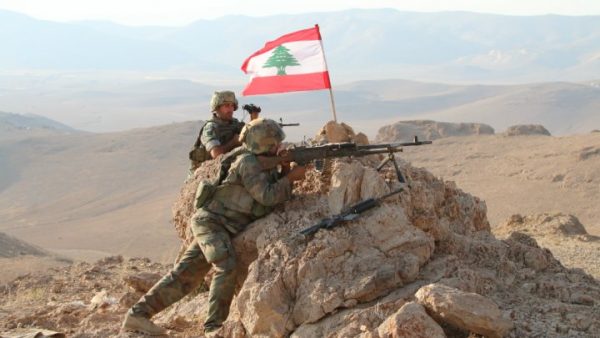File photo- Lebanese army soldiers position the Lebanese flag on top of a hill in the town of Ras Baalbek that the army recaptured from ISIS , Lebanon August 21, 2017.
By : Ya Libnan Editorial Board
On June 9, 2025, the Lebanese parliament is set to elect a new president to replace Michel Aoun, whose term expired on October 31, 2022. Once elected, the president will designate a prime minister to form a cabinet, which must then secure a parliamentary vote of confidence. A key issue facing the new government is its policy statement, which has often been a contentious topic. Hezbollah has historically insisted on incorporating the “Army, People, Resistance” formula into government policy, a formula that has significantly undermined Lebanon’s sovereignty and contributed to the country’s current crisis.
The “Army, People, Resistance” Formula: A Disaster for Lebanon
The “Army, People, Resistance” formula has effectively legitimized Hezbollah’s integration of its weapons into the state, eroding Lebanon’s sovereignty. This approach has brought catastrophic consequences, leaving the state weak and unable to assert its authority over all Lebanese territory. Hezbollah’s insistence on retaining its weapons and acting as a parallel force to the Lebanese army has alienated many Lebanese communities and left the country isolated on the international stage.
After Hezbollah’s devastating defeat in its recent conflict with Israel and the loss of its strategic ally in Syria following the fall of the Assad regime, the party’s ability to impose its will on Lebanese society has been significantly weakened. While Hezbollah’s new Secretary-General, Na’im Qassem, continues to project strength in his speeches, claiming that “the resistance continues,” the reality on the ground tells a different story. Hezbollah failed to prevent Israeli incursions into Lebanon or the destruction of Shiite-majority areas, exposing the party’s diminished capacity.
A Shift in Domestic and Regional Dynamics
The political landscape in Lebanon has shifted dramatically. Hezbollah’s traditional tactic of using arms to intimidate its opponents no longer holds sway. Recent clashes in areas like Khaldeh, Chouaya, Tayyouneh, Kahhaleh, and Ain El Rummaneh demonstrated the growing resistance to Hezbollah’s coercive methods. Communities are increasingly willing to stand up against the party, signaling a significant erosion of its influence.
Even Hezbollah’s long-time ally, Speaker Nabih Berri, recognizes the precarious position of the Shiite community, which finds itself increasingly isolated from its traditional regional allies in Syria, Iraq, and Iran. Any attempt by Hezbollah to impose its will through force risks deepening internal divisions within the Shiite community, further alienating it from the rest of Lebanese society.
The Role of the International Community
The international community will closely scrutinize the new Lebanese government’s stance on Hezbollah. Key players like the United States, France, Saudi Arabia, and the UAE will assess whether Lebanon’s government can break free from Hezbollah’s grip. Reconstruction aid, vital for rebuilding the country after years of conflict and neglect, hinges on this crucial issue. If the next government remains under Hezbollah’s thumb, Gulf Arab states are unlikely to provide the financial support Lebanon desperately needs.
Reconstruction Challenges and Hezbollah’s Diminished Resources
Rebuilding Lebanon, particularly the devastated Shiite-majority areas, will require significant international aid. Despite Na’im Qassem’s promises that Iran will fund reconstruction, the sums pledged are negligible compared to the scale of destruction. Historically, Iran’s contributions have fallen short, leaving much of the reconstruction burden to Gulf Arab countries. With Iran facing domestic pressures and reassessing its “Axis of Resistance” strategy, it is unlikely to provide substantial support.
This creates a strategic opportunity for Lebanon’s next government. By refusing to endorse the “Army, People, Resistance” formula, the government can assert its independence, regain the trust of the international community, and secure the aid necessary for reconstruction.
A New Path Forward
The next Lebanese president and government have a unique chance to redefine the country’s future. Rejecting the “Army, People, Resistance” formula is not just a symbolic gesture; it is a practical necessity to restore Lebanon’s sovereignty and stability. The Lebanese army must be the sole defender of the nation, with no competing militias or armed groups undermining its authority.
While Hezbollah may attempt to resist such a shift, the party’s declining popular support and diminished regional backing limit its options. The new government should leverage these dynamics to gradually dismantle Hezbollah’s parallel military structure and integrate its political wing into a constructive role within Lebanese society.
Conclusion
The “Army, People, Resistance” formula has been a disaster for Lebanon, enabling Hezbollah to operate as a state within a state and plunging the country into repeated crises. It is time for Lebanon’s leaders to chart a new course—one that prioritizes sovereignty, stability, and reconstruction. The international community stands ready to support a Lebanon free from Hezbollah’s dominance, but the responsibility ultimately lies with the Lebanese government to take the first steps toward this transformation. Only then can Lebanon rebuild and thrive as a unified, sovereign nation.

